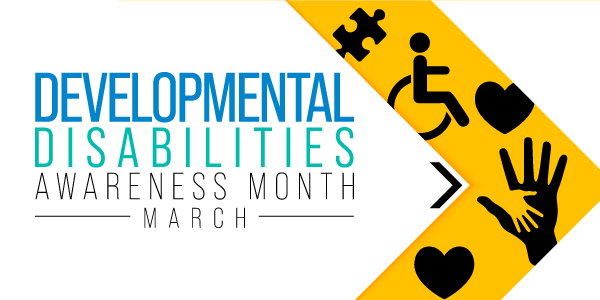
In 1987 President Ronald Reagan dedicated March as National Developmental Disabilities Month to increase awareness for Americans with developmental disabilities and to provide “both encouragement and the opportunities they need to lead productive lives and achieve their full potential.” This designation was part of a small but important shift in public perception and sparked grassroots movements which eventually led to landmark legislation such as the Americans with Disabilities Act of 1990 and later the Individuals with Disabilities Education Act.
UAB has been committed to improving resources and advocating for the developmental disability community of our state. UAB Civitan Sparks Clinics are an integral part of the Alabama University Center for Excellence in Developmental Disabilities Research, Education, and Service (UCEDD) and home to the Maternal and Child Health Bureau’s Leadership Education in Neurodevelopmental and Related Disabilities training program (LEND).
According to the Centers for Disease Control, developmental disabilities include a broad range of conditions which cause an impairment of physical, language, behavioral, and learning development. These conditions typically begin early in life and can be lifelong. Today in the US, one in six children have developmental disabilities such as Cerebral Palsy, Autism, learning disorders, intellectual disabilities, Attention Deficit Hyperactivity Disorder, and other conditions. With improvements in health care, education, and technology, individuals with developmental disabilities are receiving supports to improve health and happiness, but there remains a need to improve independence and life satisfaction for individuals with developmental disabilities across the life span.
As we recognize and celebrate Developmental Disabilities Month, let us focus on how each of us in the UAB Pediatrics community can improve awareness and accessibility to all individuals by truly having diversity, equity, and inclusion in our work. This can include sharing your story, having individuals with disabilities in your research studies, engaging people with lived experience in various aspects of your work (e.g. study design, clinical improvements), having individuals with disabilities represented in your department or division, implementing inclusive hiring practices, and working toward an environment of universal design improving access for all stakeholders, including trainees, faculty, and staff and community members.
Dr. Snehal Khatri, associate professor in the Division of Developmental-Behavioral Pediatrics
Resources
Here are ways you can take action during Disability Awareness Month:
-
Read a book
-
Demystifying Disability by Emily Ladau
-
Don’t know where to start but want to help? This is a great book to get you started.
-
-
A Quick and Easy Guide to Sex and Disability by A. Andrews
-
A comic book and a quick fun read that explores sexuality
-
-
Charlie Mae series by Hannah Wilson
-
Books for kids whose primary character is a wheelchair user
-
-
Sam’s Super Seats by Keah Brown
-
About a girl with cerebral palsy and how she explores her environment with friends
-
-
Being Heumann by Judith Heumann
-
A memoir from Judith Heumann who is a disability rights activist
-
-
Thinking in Pictures by Temple Grandin
-
Temple Grandin discusses her life as both a scientist and person with autism
-
-
The Reason I Jump by Naoki Higashida
-
Memoir written by a person in Japan with autism who is nonverbal
-
-
The Spirit Catches You and You Fall Down by Anne Fadiman
-
Explores the story of a girl with severe epilepsy and how her condition was treated and perceived by two different medical cultures (Hmong and American).
-
-
Watch a movie/show
-
Murderball
-
A documentary that follows players who participate in wheelchair rugby
-
-
Music Within
-
A biographical drama that portrays Richard Pimentel who was an activist for the Americans with Disabilities Act.
-
-
Crip Camp
-
A documentary that focuses on campers from Camp Jened who became activists for the disability rights movement
-
-
Big Sky Kitchen
-
A cooking show whose chef has a limb difference
-
-
My Left Foot
-
Biographical drama-comedy that focuses on a man who lives in Ireland with cerebral palsy
-
-
Educating Peter
-
Short documentary that follows a student with Trisomy 21
-
-
Intelligent Lives
-
A documentary that follows 3 people with disabilities
-
-
Hearts of Glass
-
A documentary following Vertical Harvest, a company with a greenhouse that provides jobs for people with disabilities
-
-
Know your implicit bias
-
Take the quiz on https://implicit.harvard.edu/implicit/takeatest.html
-
-
Support your community
-
Have some ice cream at Unless U Scoops, a non-profit organization that fosters education and job training for adults with developmental disabilities.
-
Grab a cup of coffee at Bitty and Beau’s Coffee who focuses on the employment of individuals with disabilities (opening soon in Homewood!)
-
East some goods at the Ability Baking Company food truck (follow their Facebook page for locations). Arcability, with grant funding from Alagasco/Spire and The Daniel Foundation, provides baking classes and training individuals with disabilities for employment in the food service industry.
-
-
Advocacy
-
Alabama Disabilities Advocacy Program (ADAP): Federally funded protection and advocacy program for people with disabilities to protect, promote, and expand their rights. We often refer to their services if a school does not comply with 504 or individualized education plans (IEPs).
-
Children’s Rehabilitation Services: A state-funded government program that has an incredible network of resources and clinics for children with disabilities.
-
Lakeshore Foundation: Lakeshore Foundation is a not-for-profit organization that promotes independence for persons with physically disabling conditions. The Foundation offers a wide range of fitness, recreation, athletic and education programs to members and participates in research and local, national and global advocacy.
-
-
-
Dr. Kelli Chaviano, assistant professor in the Division of Pediatric Rehabilitation Medicine